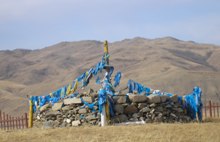BBC asks why so many green campaigners rely on religious language
January 26, 2010:
 |
 |
 |
Why do we so often use religious imagery in the environmental movement? |
If the case for tackling climate change is backed by science, why do so many green campaigners rely on the language of religion?
This was the question at the centre of the BBC Radio 4 Analysis programme yesterday, January 25, in a programme that included interviews with some of the UK’s leading climate thinkers including ARC’s Director, Martin Palmer.
“I am looking at a clock that is counting down the months, days, hours and minutes until planet Earth reaches "the point of no return", writes Helen Grady from the Analysis team, in her preview article to the programme.
“As I type, we have 83 months to go. The end of the world, if not exactly nigh, certainly seems to be on its way. But this doomsday countdown has not been devised by a religious cult or millenarian seer. It is on the website of the New Economics Foundation (Nef), designed to raise awareness about climate change.”
In his interview, Palmer told the BBC about how elements of the green movement have come increasingly to rely on visions of hell as a way of converting people to their cause. "In the 70s and 80s, environmentalists thought that if they presented people with the scientific facts, they would realise how desperate the crisis was… and would change. That optimism started to fade in the 90s. They realised that no one is converted by a pie chart, so they started trying to motivate us through fear,” he said.
"Now they are playing with some of the most powerful emotional triggers in Western culture. They've adopted the language and imagery of a millenarian cult... Environmentalists have stolen fear, guilt and sin from religion, but they have left behind celebration, hope and redemption. They read science in the way that fundamentalists read religious texts: they cherry-pick the bits that support their argument and use them to scare people," he adds.
"Then they offer no solutions other than letting greens take over the running of the world."
The programme also included interviews with Nef's policy director Andrew Simms, Solitaire Townsend, co-founder of the firm Futerra, Professor Mike Hulme, who founded the Tyndall Centre for Climate Change Research, and leading environmentalist Jonathon Porritt.
Ms Grady's article was immediately picked up by the Ethiopian Review.
Link here to listen to the full programme. Link here for the full story.
|

